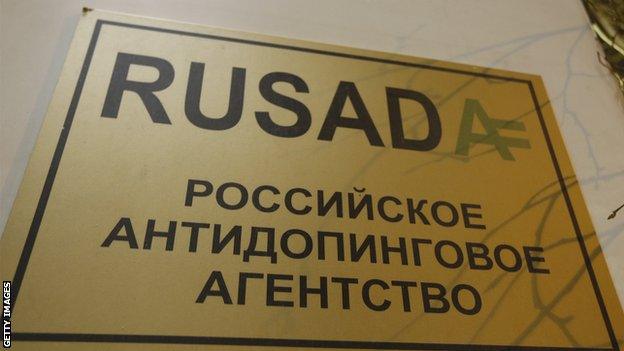World Anti-Doping Agency retrieves 2,262 samples from Russian lab
- Published

Leading athletes have opposed the lifting of Russia's suspension
A World Anti-Doping Agency team has retrieved 2,262 samples from the Russian Anti-Doping Agency's (Rusada) laboratory in Moscow.
It follows the retrieval of data from the laboratory in January.
That visit was a condition of Russia's reinstatement in September 2018, ending a three-year suspension following a scandal over state-sponsored doping.
The samples are on their way to a Wada-accredited laboratory outside of Russia.
They "will be used to strengthen cases against those who may have cheated and may exonerate athletes who have not committed an anti-doping rule violation", according to Wada.
Wada said its Intelligence and Investigations (I&I) unit had been working on a mission since January to extract all relevant samples still contained within the laboratory.
Russia's initial failure to provide full access to the laboratory and data before a December 2018 deadline led to 16 national anti-doping bodies (Nados) and Wada's athlete committee to call for the country to be suspended from Wada. Wada eventually gained access on 10 January. and announced on 22 January that Russia's would face no punishment.
In January, Wada said the data is "crucial to build strong cases against cheats and exonerate others suspected of having participated in widespread doping".
"This is a major breakthrough for clean sport," said Wada president Sir Craig Reedie.
A report from Professor Richard McLaren in July 2016 found Russia operated a state-sponsored doping programme for four years across the "vast majority" of Olympic sports.
A subsequent report stated more than 1,000 Russian athletes benefited from doping. Russia was later banned from competing at the 2018 Winter Olympics.
Wada demanded Russia meet two criteria before Rusada could be reinstated to competition: accept the findings of the McLaren report, and grant access to Moscow's anti-doping laboratory.
Wada said on Tuesday that an authentication process of the Moscow data is close to completion and that a progress report will be presented at the next meetings of Wada's Executive Committee and Foundation Board on 15 and 16 May.
How the Russian doping scandal unfolded
December 2014: As many as 99% of Russian athletes are guilty of doping, a German TV documentary alleges.
November 2015: A Wada commission publishes an independent report alleging widespread corruption, amounting to state-sponsored doping in Russian track and field athletics. Rusada is declared non-compliant.
May 2016: Former Moscow anti-doping laboratory boss Grigory Rodchenkov,, external who has turned whistleblower, says dozens of Russian athletes at the 2014 Winter Olympics in Sochi had cheated.
July 2016: Russia operated a state-sponsored doping programme for four years across the "vast majority" of summer and winter Olympic sports, says a report from Professor Richard McLaren.
August 2016: International Olympic Committee (IOC) decides against imposing a blanket ban on Russian athletes at the 2016 Olympics in Rio. Individual sporting federations rule instead, with 271 Russians competing.
December 2016: Wada publishes the second part of the McLaren report which says more than 1,000 Russian athletes benefited from doping.
January 2017: Rusada and Russian sport authorities given list of criteria, external to achieve before winning back recognition.
March 2017: Wada says Russia's anti-doping reforms are not happening quickly enough.
February 2018: Russia are banned from competing at 2018 Winter Olympics in South Korea by the IOC, but 169 athletes who prove they are clean allowed to compete under a neutral flag.
May 2018: Wada writes to Rusada offering 'compromise' solution.
September 2018: News of the compromise, revealed by the BBC, prompts fury from athletes and doping bodies.
December 2018: Wada team is unable to access Moscow laboratory and data.
January 2019: Wada team gains access to Moscow laboratory and data.
April 2019. Wada collects 2,262 samples from the laboratory, split into A and B samples and contained within 4,524 collection bottles.